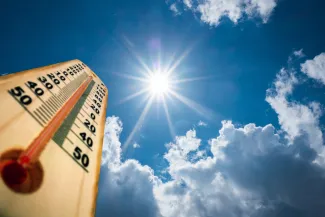Experts on how to beat the heat – quick fixes and long-term solutions
Summer increases the risk of overheating in homes. But why does this happen? What impact does it have on your body and your living environment? And most importantly, how can you manage it effectively? Experts provide insights, explanations, and practical tips to help you stay cool and safe.

Four times more heatwave days and peaks of 50°C by 2050?
Climate scientist Niels Souverijns (VITO) quickly counters such extreme claims:
"It probably won’t come to that. Thankfully, such worst-case scenarios are not always the most realistic ones. A doubling of the number of heatwave days by 2050 is more plausible. It also appears that prolonged heatwaves will become more frequent."
"Heatwaves will also intensify, with higher temperature peaks – and we’ll feel that," adds Samuel Helsen, climatologist and meteorologist at Meteosupport.
Up to four degrees warmer in cities than in the countryside
During heatwaves, cities are often several degrees warmer than rural areas – especially at night.
"Buildings absorb solar radiation during the day and release that heat again at night," explains Souverijns. In the countryside, there's less dense development and more greenery and water, which promote evaporation and help cool the surroundings. As a result, temperatures there can be on average four degrees lower than in urban areas.
From loss of focus and poor sleep to heat-related deaths
Hot summers caused, on average, 461 deaths per year in Belgium between 2000 and 2019, mainly among vulnerable groups (elderly people, infants, and those with chronic illnesses). According to thermal physiologist Hein Daanen (VU Amsterdam), the best way to cope with extreme heat is to stay in the coolest parts of your home, avoid physical exertion, keep hydrated, wear suitable clothing, and eat light meals.
This advice applies to healthy individuals too. For them, heat is rarely fatal, but if it gets too hot, Daanen warns:
"Your attention span drops, your performance declines, you sleep poorly, and you may experience headaches and digestive issues."
Preventing overheating? Shield tour windows and adopt smart habits
Ultimately, the key goal is to prevent indoor overheating. And that often starts with the windows:
Is the sun shining directly through them? Then you have a problem.
Awnings, roof overhangs, exterior blinds, or even a strategically planted tree can make a big difference.
Prof. Dr. Ir. Hilde Breesch (Building Physics and Sustainable Construction, KU Leuven) suggests:
"During a heatwave, keep everything tightly shut during the day. As soon as it’s cooler outside than inside, open windows and doors on both levels of your house overnight. This helps cool the home so it can buffer heat again the next day."
And don’t forget the heat produced by appliances and cooking – these contribute more than you might think.
Building or renovating? Think preventively from the design phase
If you’re planning to build or renovate, it’s crucial to address overheating sustainably and structurally. A phased approach is recommended:
- Greenery and water near the home for natural cooling via evaporation and shading.
- Smart choices in window orientation, placement, and size – including external shading.
- Use of passive cooling techniques like night ventilation and cross-ventilation to release accumulated heat.
Only consider active cooling like air conditioning as a last resort – not only does it consume a lot of energy, it also emits residual heat into the environment, worsening climate effects.
Joost Declercq, civil engineer-architect and research director at Archipelago Architects (affiliated with KU Leuven), concludes:
"If you need active cooling to manage indoor temperatures, that’s a sign something is wrong with the building’s design. In our climate, it’s perfectly possible to design buildings that don’t require mechanical cooling. That’s exactly what we, as architects, should be striving for on a large scale."












